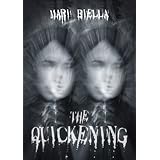Reviewed by Dennis Hamley
From the very first page of this absorbing psychological,
supernatural, highly atmospheric thriller I knew exactly the territory I was
treading. I recognised the calm,
reasonable narrative tone: the voice of an educated, thinking, rational person,
bookish even, who was about to experience terror fit to shrivel the blood. The book starts with the narrator’s
unambiguous statement of the sort of story he is about to tell. This is the style and technique of Edgar Allan
Poe, MR James, Henry James in The Turn of
the Screw, and in our own day, Susan Hill in The Woman in Black, The Mist
in the Mirror and The Small Hand:
even Kate Mosse in such a book as The
Summer Ghosts. And it is done
extremely well – as well as Poe, the two Jameses and Hill: better, I have to
say, than Mosse.

Lawrence Fairweather, an amateur botanist with a private
income, lives with Julia, his wife, and their seven year-old daughter
Hazel. They have returned from Europe to
Lawrence’s family home on the Fens: a lonely house in the flat countryside
beset by wind and rain straight from the Urals, lying under huge skies: the
sort of fictional
Soon, we know there are not merely bad memories but actual presences
in the house. The rational and
self-absorbed Fairweather will not allow the supernatural into his thoughts:
nevertheless the unnamed menace grows. Dr Devonald is their only friend and offers what understanding and solace
he can. But in a crucial episode at a
dinner-party in Devonald’s house with his sister Sophie and a visiting medium,
events occur which show there is something evil connected with but not altogether of
the house because it directly affects Julia herself. What
are we in the presence of? A real
haunting or a psychosis? Or both?
The tragedy moves swiftly and even more effectively because
it is mediated through Fairweather’s increasingly urgent, frightened. slightly
unreliable voice as he realises that more self-awareness on his part might have
prevented much of it. The conclusion is
not a shock to us, there is something even inevitable about it, but it is none
the less terrible.
No comments:
Post a Comment